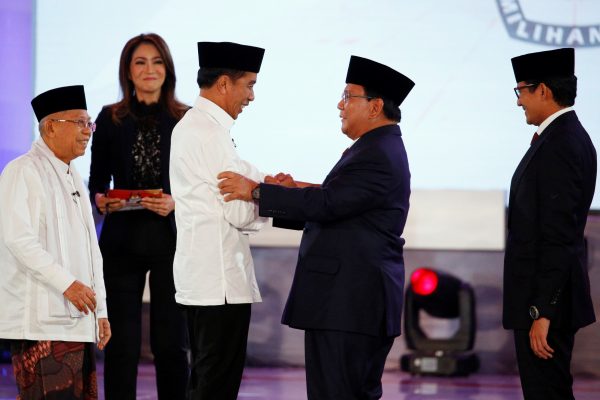After attacks in East Java in May 2018, Indonesia’s House of Representatives ratified a new terrorism law. By mid-December, the Indonesian National Police had arrested 372 terrorist suspects by dint of the new law. Yet questions remain as to whether these measures will be enough to root out terrorism in Indonesia. What are the presidential candidates’ programs to address this perennial security threat?
Indonesian President Joko Widodo (Jokowi) and his running mate Ma’ruf Amin’s campaign missions highlight their vision to enhance integrated efforts to prevent terrorism. They emphasised the importance of national ideology in curbing radicalism, the development of the education system and empowering law enforcement. Amin’s speech during the presidential debate reaffirmed that the pair will zero in on the prevention and prosecution of terrorism.
But the Jokowi–Amin vision is not without holes. They underline the importance of strengthening coordination and cooperation between relevant stakeholders. But this mission is too vague. Relevant stakeholders in Indonesia have already been working on the issue for some time — they have yet to achieve effective coordination due to a deeply ingrained culture of agencies competing for credibility.
Currently, the work of the National Counterterrorism Agency (BNPT) and experienced civil society organisations (CSOs) are poorly coordinated. Since last year’s counterterrorism law assigned a coordinative role to the BNPT, the agency should map out and make accessible existing stakeholder activities and update them periodically to allow better coordination.
Meanwhile, as chairman of the Indonesian Ulema Council (MUI), Ma’ruf Amin has sought to downplay the perception that ideology is the determining factor in radicalisation. The MUI has issued a fatwa, he explained, ruling that terrorism is not a jihad and that it is haram (forbidden). Amin argues that a multifaceted approach — including religious, social, economic and cultural aspects — is required to understand and tackle terrorism.
But the MUI fatwa may not be able to reach terrorist networks, particularly Islamic State sympathisers. These sympathisers believe the Indonesian government is a thaghut (idolatrous) government and that anyone who pledges allegiance to it is a kafir (non-believer). Instead of relying on the fatwa, the government should focus on improving Islamic clerics’ ability to approach radical individuals, starting by providing counselling training.
Opposition presidential candidate Prabowo Subianto and running mate Sandiaga Uno’s counterterrorism vision focuses on carrying out security sector reform, empowering law enforcement, launching a socio-cultural campaign and enhancing synergies between the defence and security apparatuses.
Because there are no significant differences between the Jokowi–Amin and Subianto–Uno visions on counterterrorism, there was no constructive discussion on the issue during the presidential debate. But Subianto’s argument about the roots of terrorism was interesting to note. He asserted that terrorism is the result of social injustice and subversive infiltration by foreign actors.
The second part of the claim echoes former Indonesian military chief General Gatot Nurmantyo’s notion of the ‘proxy war’. This statement is likely to appeal to a group of voters who are reluctant to acknowledge the problem of homegrown terrorism and believe that terrorism is a conspiracy propagated by foreign powers such as the United States. Subianto’s statement resonates with the 212 Movement, whose head Slamet Maarif argues that terrorism is a means to institutionalise Islamophobia.
These statements may hamper the government’s efforts in developing an early warning system for terrorist attacks. Relevant government Institutions and CSOs have been engaging local society to identify suspicious activities or behaviours. But without knowledge of root causes, this system may not be effective in supplementing intelligence efforts.
Both candidates failed to deliver a well-rounded strategy in combating terrorism. They share similar visions of countering radicalism through empowering law enforcement and developing the education system. But not enough attention was paid to addressing long-standing problems in coordinating counterterrorism policy stakeholders.
There was also insufficient discussion on prison management. The Indonesian National Police is currently struggling to accommodate hundreds of terrorist suspects. Most of them are detained in local police stations whose staff do not fully understand how to manage terrorist detainees. The candidates should have identified their plans for addressing this situation as ill treatment can fuel further resentment towards the government.
Neither camp brought up a strategy for sustainable reintegration and aftercare programs. The relevant stakeholders frequently encounter obstacles to providing and monitoring aftercare programs for former inmates due to Indonesia’s sheer size. Both camps could have discussed how to involve local governments and civil society in assisting former inmates’ reintegration and preventing their return to their old networks.
Lacking detailed policy plans, the presidential candidates left viewers unimpressed. Both candidates should have identified what works and what does not work in the current counterterrorism strategy — this would have been a valuable first step towards a more substantial, constructive discussion on a critical issue for Indonesia.
Chaula Rininta Anindya is a Research Analyst with the Indonesia Programme of the S Rajaratnam School of International Studies (RSIS), Nanyang Technological University, Singapore.

